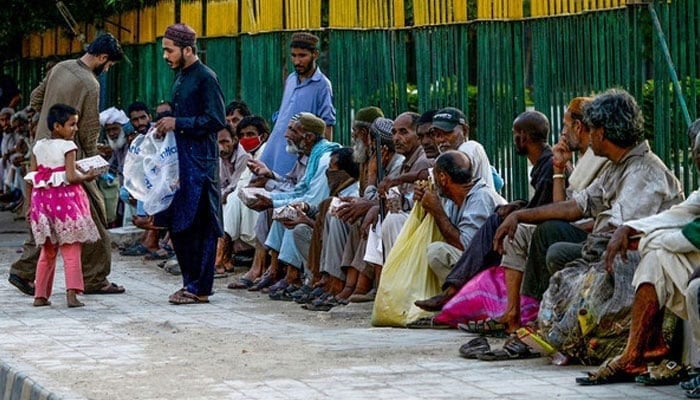ADB highlights persistent poverty, climate vulnerability in Pakistan, region
Central and West Asia continue to experience development disparities and social welfare challenges
ISLAMABAD: The Asian Development Bank (ADB) has highlighted that Pakistan, Afghanistan, and the Kyrgyz Republic continue to face high poverty levels and limited access to essential services, according to its 2024 Annual Report, released on Thursday.
Despite overall economic progress, Central and West Asia continue to experience development disparities and social welfare challenges. Pakistan, identified as one of the region’s most climate-vulnerable country, incurs annual losses exceeding $2 billion due to disaster events-disproportionately impacting women and vulnerable populations. In 2024, the ADB extended a $500 million policy-based loan to strengthen Pakistan’s disaster management capacities. The program supports disaster risk mapping, preparedness, and the mobilisation of public and private financing. The ADB also reported updates on its accountability mechanism, noting that four complaints-two from Pakistan-were found ineligible for compliance review by the compliance review panel. A working group was formed to review the 2012 Accountability Mechanism Policy, and a new chair for the panel was recommended. In Pakistan and Georgia, ADB closed four older complaint cases, confirming successful implementation of mitigation measures. Training sessions on accountability and retaliation risks reached 394 officials across several countries, including Pakistan, and involved 80 civil society representatives. The ADB’s conditional cash transfer program in Pakistan benefitted 9.3 million people in 2024, targeting poor women and families. A further $330 million was committed to enhance this program by expanding access to education, nutrition, and health services in disaster-prone areas. ADB also launched initiatives to address urban challenges in Pakistan, where rapid urbanisation, inadequate planning, and climate impacts threaten living standards. A newly published report proposes a sustainable urbanisation model focused on resilient infrastructure, gender-responsive budgeting, and public-private partnerships. In a landmark investment, ADB committed a $41.2 million nonsovereign loan to support SAFCO Venture Holdings in establishing a facility in Sheikhupura to produce 200,000 tons of sustainable aviation fuel annually.
This project, the bank’s first under the Innovative Finance Facility for Climate in Asia and the Pacific (IF-CAP), will reduce carbon emissions by up to 85pc and export its entire output to the European Union, generating crucial foreign exchange for Pakistan. ADB also supported city-level climate action plans in Pakistan, India, and Uzbekistan and continued investments in transitioning the region away from fossil fuels.
-
 Meghan Markle, Prince Harry Friends Suggest Their Marriage 'isn't All It Seems'
Meghan Markle, Prince Harry Friends Suggest Their Marriage 'isn't All It Seems' -
 Andrew Handed Out 'classified' Information To Jeffrey Epstein
Andrew Handed Out 'classified' Information To Jeffrey Epstein -
 Margot Robbie Recalls Wild Party Days And Getting Kicked Out Of Clubs
Margot Robbie Recalls Wild Party Days And Getting Kicked Out Of Clubs -
 NASA's Hubble Space Telescope Discovers ‘Dracula Disk', 40 Times Bigger Than Solar System
NASA's Hubble Space Telescope Discovers ‘Dracula Disk', 40 Times Bigger Than Solar System -
 Annular Solar Eclipse 2026: Where And How To Watch ‘ring Of Fire’
Annular Solar Eclipse 2026: Where And How To Watch ‘ring Of Fire’ -
 Zayn Malik Explains Past Comments About Not Being In Love With Gigi Hadid
Zayn Malik Explains Past Comments About Not Being In Love With Gigi Hadid -
 Internet Reacts To 10 Days Flight Ban Over El Paso
Internet Reacts To 10 Days Flight Ban Over El Paso -
 YouTube Music Tests AI-powered ‘Your Week’ Recap To Summarise Listening Habits
YouTube Music Tests AI-powered ‘Your Week’ Recap To Summarise Listening Habits -
 Kelly Clarkson Ready To Date After Talk Show Exit?
Kelly Clarkson Ready To Date After Talk Show Exit? -
 Is AI Heading Into Dangerous Territory? Experts Warn Of Alarming New Trends
Is AI Heading Into Dangerous Territory? Experts Warn Of Alarming New Trends -
 Google Updates Search Tools To Simplify Removal Of Non-consensual Explicit Images
Google Updates Search Tools To Simplify Removal Of Non-consensual Explicit Images -
 Chilling Details Emerge On Jeffrey Epstein’s Parties: Satanic Rights Were Held & People Died In Rough Intimacy
Chilling Details Emerge On Jeffrey Epstein’s Parties: Satanic Rights Were Held & People Died In Rough Intimacy -
 50 Cent Gets Standing Ovation From Eminem In New 'award Video'
50 Cent Gets Standing Ovation From Eminem In New 'award Video' -
 Bad Bunny Delivers Sharp Message To Authorities In Super Bowl Halftime Show
Bad Bunny Delivers Sharp Message To Authorities In Super Bowl Halftime Show -
 Prince William 'worst Nightmare' Becomes Reality
Prince William 'worst Nightmare' Becomes Reality -
 Thai School Shooting: Gunman Opened Fire At School In Southern Thailand Holding Teachers, Students Hostage
Thai School Shooting: Gunman Opened Fire At School In Southern Thailand Holding Teachers, Students Hostage




